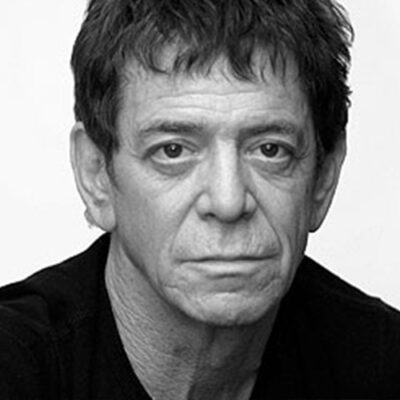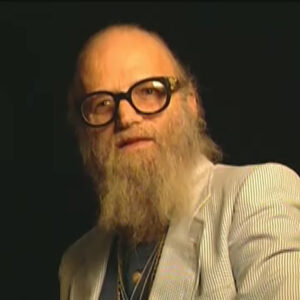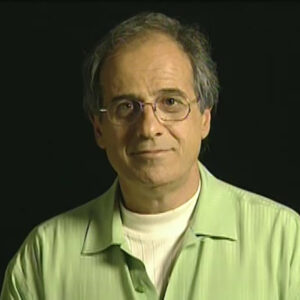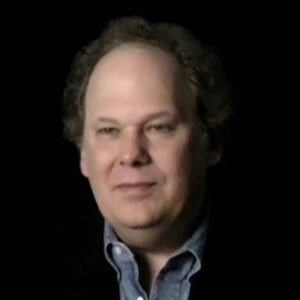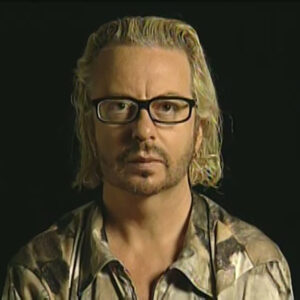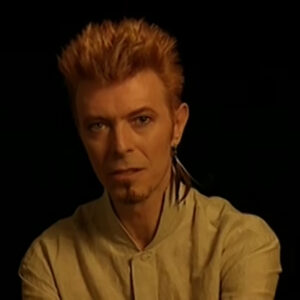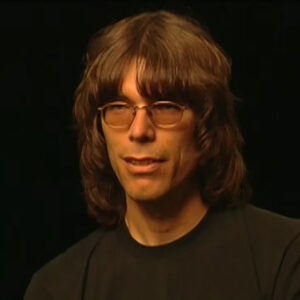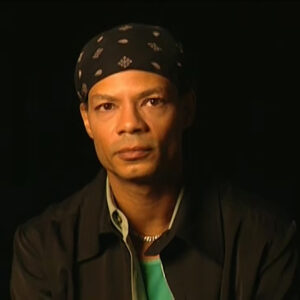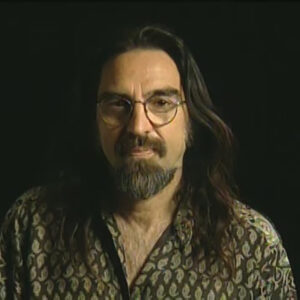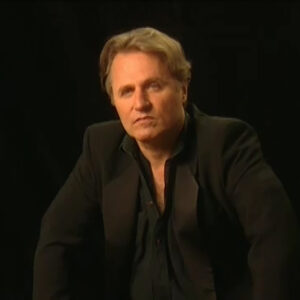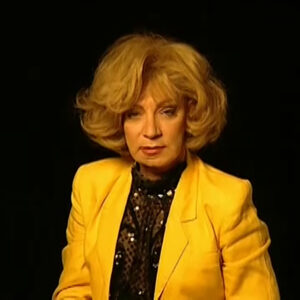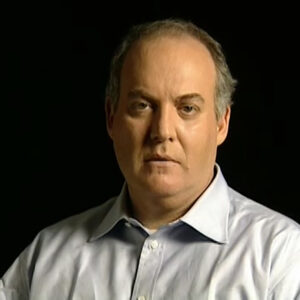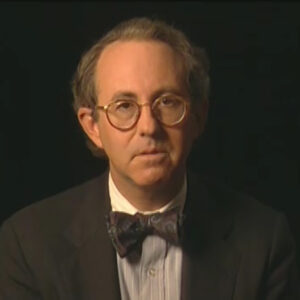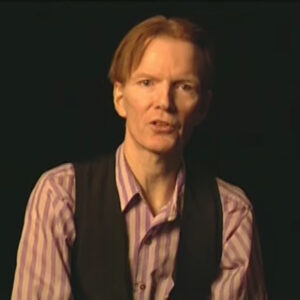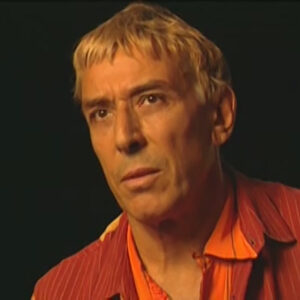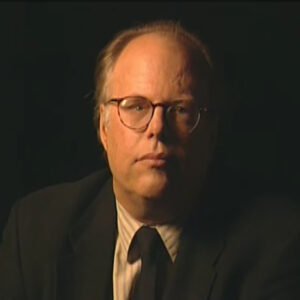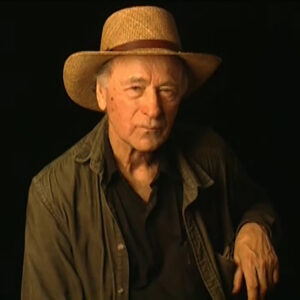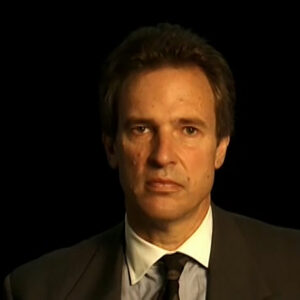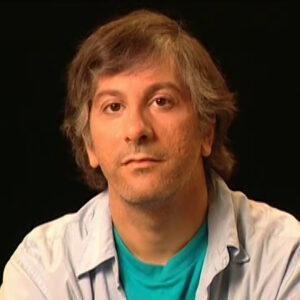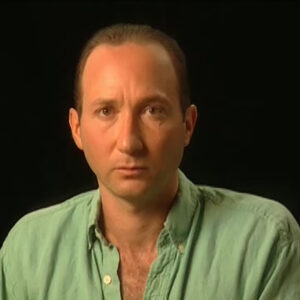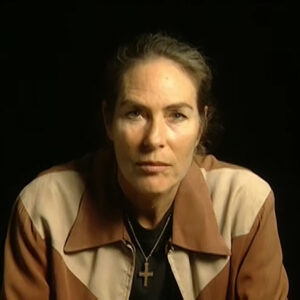Interviewer: And the people you were taking pictures of?
Nan Goldin: Well, I would say I started when I was about 15 and I was going to a hippie free school and they gave us Polaroids because some of the teachers were from they were graduates to students at M.I.T. and one of them was the daughter of one of the big, I think. R.D. Lange or one of the big therapists, the time, so somehow the idea God came to give the students at this hippy free school cameras. So I started with a Polaroid at my earliest influences had nothing to do with photography. It was to do with Warhol movies and Jack Smith’s movies. And because we as free school had no classes, like one day there’d be a class on ontology recapitulates phylogeny and then it would never be held again. And then there’d be a class on, you know, ex-American exile painters in Paris and then there’d never. So it was a school of dilettantism, but it also enabled us to go to the movies every single day. And in those years, in the late 60s, early 70s in Boston, there was an incredible cinema. So we’d go to three movies a day and we were, you know, 14, 15. And we saw Jack Smith’s flaming creatures. We saw all of the early Warhol of the early Moris today. And this was really the major influence on my life. So when I first what I first did besides the Polaroids of my friends, was I got a Super eight movie camera. I made everyone strip. And then I zoomed in and out of in them. And they’re the most boring movies ever made in the history of Super eight. But I was you know, that to me was filmmaking.
Interviewer: Tell me again how you get it started to take more portraits, or is it the work that we know today really about the people you’ve started to?
Nan Goldin: I would say the work now is a continuum directly of the work at fifteen. The first person I ever photographed was David Armstrong, who still my best friend and I photographed last night. And so we’re talking about 28 year history, a 25 year old history. And the work still comes from the same motivation of love and wanting to make people look beautiful. And I think that’s probably part of the song I’ll Be Your Mirror. Such an effect on me was this thing of I will reflect to you the beauty that you are was really one of the huge motivations of my life was to make an march to these people when I was 18. David started doing drag and I immediately fell in love with this drag queen, like really fell in love with a queen. At the time, there was nothing written about women who were in love with drag queens because they were considered too sick to be even written about. And I became obsessed with these queens and I lived with them for three years and photographed them extensively. And that was my first really major body of work. And at that time, we hung out at a bar called The Other Side and drag in Boston in the 70s was so underground that you couldn’t go out during the day. So, I mean, this isn’t like RU Paul. There’s no talk shows. There’s no, you know, makeup artist. There’s it’s I mean, it’s great for the teenagers that it’s so acceptable now. But at that time, it was so underground that that also had it’s a lower you know, in a sense, it was hard life for them. But we went to this bar every single night. And one night Candy Darling showed up there. Because in New York, Dolls were playing in New York, in Boston. So that was a great night and all the Queens had to be photographed with candy, darling.
Interviewer: And what year was that?
Nan Goldin: Seventy two.
Interviewer: So that’s another type of transformer, I guess. So tell me again about the music of Lou and the lyrics of Lou. I guess it’s certainly the listening tour since.
Nan Goldin: 13.
Interviewer: Yes,.
Nan Goldin: I was actually at 12 or 13. I went to see him in Boston at.
Nan Goldin: Started over again. You see, Lou,.
Nan Goldin: I went to see Lou Reed perform at 12 or 13. I went to see the Velvet Underground perform with the plastic exploding inevitable in Boston. I think my parents picked me up afterwards, but I was still living at home. But I you know, for me, it was the height. It was. That was the height. It was probably one of the great theatrical experiences of my life, OEM’s until this day. And I started listening to his music at about 13. I was in this very bizarre boarding school. There were thirty five men and boys and six or seven girls. And it turned out it was run by a pederast. And the teachers were having sex with the boys. But it’s something I never talked about because people don’t believe me. But that’s how I got introduced to gay life, very young. And I became obsessed with that album at that time, the banana album. And I started taking acid and listening to the album. And at that time, my dream was to grow up to be a junkie and Islam goddess. And I read I somehow got copies of the old East Village other or the old Eatonville Village. I. And, you know, I wanted to be a slum goddess. That was my dream.
Interviewer: Can you go back for a second because you say so? Yeah, sorry. But I think I’ve been totally blown away that you saw the Exploding Plastic inevitable, so.
Nan Goldin: I can’t name of the place that would have been or. Yeah, it was. I know exactly what street it was always like on Karpin Street.
Interviewer: Maybe. But if you could talk about what you saw there and maybe, you know, the whip dancing or whatever there was and the visuals of it, because it’s incredible.
Nan Goldin: OK. So.
Interviewer: You use the word. I saw what I saw. Exploding Plastic Inevitable.
Nan Goldin: When I saw the exploding plastic inevitable, I saw Nico and she was you know, there are two women that I worshipped were Nico and Viva, and that’s who I wanted to be in my life. And so Nico was there. The. Amazing amount of visuals that were going on simultaneously. Was a trip in itself. I mean, it was, you know. Amplified by drugs. But it was without drugs. It was also I don’t remember if I was tripping at that point yet, but it was so extreme for me. The amount of stimulus that one could create in an environment like that was unbelievable to me.
Interviewer: Nico was seeing and there was dancing and.
Nan Goldin: Yeah, there were dancers and there was the pillows exploding and the words, the light shows. And there were, you know, lots and lots of plastic pillows. And the dancers and.
Interviewer: Was Andy there.
Nan Goldin: I don’t know. For me, Lou Reed is sort of Andy Warhols voice.
Interviewer: Talk about that.
Nan Goldin: Well, because Warhol made, you know, his persona based on his NOM verbalization. And to me, Lou Reed’s lyrics were saying to me what I thought, that the rap, the studio represented that I so desired this whole lifestyle, this whole way of thinking, a whole static, whole acceptance of life without any gender boundaries, a whole like tribe of people had found each other. This whole issue of the stable of like soup, because also I grew up watching a lot of 30s and 40s movie stars like glamor, movie stars, movies. I saw everything with Marlene, everything with Barbara Stanwyck, everything with Marilyn. You know, so to me, this was a Reppas replication of that kind of star system, which I, I also sort of half in my own work. I have my superstars that I’ve been shooting for 20, 25 years, like Sharon and Cookie was one of my superstars.
Interviewer: And talk about that more, because I think that is a wonderful parallel in that you’ve sort of done that.
Nan Goldin: Yeah, I see. That is coming a lot from the influence of early Warhol. And from the 30s and 40s glamour movies that I found, people that I’ve continued to have and Cassavetes also and continue to have this ongoing, very intimate relationship with and sort of people that, you know, like it says, and I’ll be your mayor. It wouldn’t necessarily be considered immediately beautiful to the norm normal or wouldn’t be considered beautiful at all, hopefully to an American population. But I saw that this incredible specialness in them. And I still have that even with new people where I find people that they don’t even know how special they are. And I helped them see it through the pictures. People have told me that they didn’t really realize how beautiful they were. They didn’t know who they were. In the last year, people have told me that.
Interviewer: I think it’s a wonderful point because, you know, the way Lou is written about all these, what we think are bizarre people, but one of the people yesterday was talking about how the tied him as a writer with hope. Everyone, you know, is really pretty amazing and that you don’t have to go too far. You could write about your grandmother. He was talking about interviewing his grandmother, about the couch that she bought in 1962. How could you have bought that couch it out?
Nan Goldin: I don’t know. I can’t give you leave New York. I’m scared of America. I don’t think they’re so amazing. They take the jitney and listen to what they talk about. There’s a lot of a lot of amazing people.
Interviewer: All right. So I would love.
Nan Goldin: I wish I did. I know.
Interviewer: I’d like you to talk about. Let’s just talk. Let’s just jump in for a second. How did we get this? Keep rolling. The next thing what I ask you is to talk about the people you photographed. And if you care about how you think those songs, you know, I walk on the wild side and all the sort of Lou Reed songs. Any particular songs even that made a lot of impact or even how, Lou, how, you know, it was talked about by these people. Was it something that was music in the background to sort of try and set a scene for me? Of the use of the importance of Lou in that sense?
Nan Goldin: Yeah. And Lou Reed’s music was always running through my adolescence, first in this weird school where I was so isolated, you know, and listening to this album and tripping over and over and over again. And then later, when I was living with the Queens and we were always listening to Candy Says, and Lou was always a part. And even in the last years, I listened to very little contemporary music. I’ve become a fan of Bach and Schubert and, you know, Glenn Gould. And so I don’t but I do listen to New York a lot. He’s one of the only contemporary people I still listen to. Still interests me and who still lyric still really resonate to me and teach me something.
Interviewer: And is that what is that? No, it’s just that he continues to challenge himself.
Nan Goldin: I just think that, you know, it was like a great writer. It’s the issue of being able to verbalize something so simply and so succinctly and so profoundly. And the things he said, you know, during like I said, I really see him as Warhols voice or the voice of the factory. All those songs that, you know, Niko sings most things after hours. You know, all those songs are so important to me and so much a part of what I lived through in my life. The Candy Darling song. By that time, I already lived with Quain, so it wasn’t like a revolutionary song to me, like it may have been to many Americans. But the whole thing of she plucked her eyebrows on the bus and then he was she. And this was us. And we knew this. Absolutely. That no one could change gender that easily and that one could that all you had to do was to get to New York. And you had to get out of America and you could get to New York and you could be who you wanted to be. I completely believed since I was young and self recreation, I left my family at 14 and I Re-created myself and I believed, as Oscar Wilde said, you can be whoever you pretend to be. And I think that that gave me confirmation.
Interviewer: As I said, I want you to go back. We’re almost done. I just want you to go back a minute. Talk about your mirror a little bit more, maybe in context of your show or.
Nan Goldin: Yes.
Interviewer: Explain it to show Whitney. Right.
Nan Goldin: I’ve put out a I had a show at the Whitney retrospective in the last 25 years of my work and opened in October of 96. And it’s still travelling in Europe and will be until ninety eight or ninety nine. And I chose the title I’ll Be Your Mirror for two reasons, because I’ve been doing a slide show called The Ballad of Sexual Dependency for about 15 years. And I’ve always used up your mirror in that slide show without Lou’s permission, which he has finally sweetly granted me when he finally saw the show I’d been using that I’d been using after hours. I’d been using heroin at one point, but not anymore. I’d been using all tomorrow’s parties. I’d been using a lot of his music because it goes so perfectly with my imagery and the life that I lived in that I documented. So I decided to name it, I’ll Be a Mirror. Both the retrospective catalogue, which is a big heavy book and of all my life’s work and the show, partially because of Lou’s song and the meaning that I’d always had to me. And also because at the same time I got a letter from a friend of mine in Germany has AIDS, and I had photographed him. And in the letter he said, I never knew who I was until I saw that picture. You’re the mirror to my soul. And I was like, so for those two reasons. Between the mean the fact that I’d use Lou’s songs for twenty four, fifteen or sixteen years and that that song had meant so much to me. And then I had gotten this letter where the person was saying, You are my mirror. I decided to name. I asked Lou. And he very generously allowed me. He was very generous with me about seeing the slide show. After all the years I’d been showing it, finding out I’d use this music without permission and just laughing and smoking a cigar. And he was very generous without allowing me to use it as the title of a BBC documentary about me and the Whitney retrospective. He was very sweet. We met at Paul Ulster’s house in 1995 at a dinner party. And that’s the first time I actually met.
Interviewer: Karen, anything I’m forgetting?
Nan Goldin: Oh, there’s something I want to say.
Interviewer: OK. You’re looking at this. You know, I think it’s fine if Nan just keep doing this. It’s beautiful. OK.
Interviewer 2: If you see this. Yeah.
Interviewer: Would you. Yeah,.
Interviewer 2: I can.
Nan Goldin: I couldn’t make a one on two.
Interviewer 2: Two amazing people in America really love America.
Nan Goldin: Really.
Interviewer 2: I know you just I mean, I’ve come to New York many ways.
Interviewer: I need you.
Nan Goldin: I can understand that it’s turning into a college campus. Feels so cleaned of. It’s so hard to replace. For me. It’s very trendy, right? Yeah.
Interviewer: OK. You said Candy, so when you both walk on the wild side. So if you can just look at me, pull back a little bit and just say walk on the wild side a couple of times so we can splice it in where it’s supposed to be.
Nan Goldin: Should I sing it. Yes.
Interviewer: Just look at me. Shoot out a little bit. Yeah.
Nan Goldin: Walk a walk on the wild side. Walk on the wild side. Walk on the wild side.
Interviewer: OK. And then if you could talk again about just say, Lou Reed with Andy Warhol’s voice a couple of times, because that’s wonderful.
Nan Goldin: I believe that Lou Reed was Andy Warhol twice. I believe that Lou Reed was Andy Warhol voice. He was the text for Andy Warhol who never really spoke, articulated what the meaning of his life are, his studio was. But Lou was the one who told us really. The other thing I want to say is that so. I could say that, you know, Lou Reed and the Velvet Underground was an influence for me wanting to be a junkie. I can also say on the other side that Lou Reed being clean and hearing this, you know, on the grapevine was an inspiration to me to want to get sober. So it worked both ways.
Interviewer: That’s quite a statement. I want you to go back and just talk about my first experience with photography. You talked about the people you photographed. You sort of saw superstars. You could say, again, that sort of link it to the Warhol factory superstars system. Right. So it’s more clear how you kind of.
Nan Goldin: Yeah, I did. I directly linked the idea of the Warhol superstar’s VVA Ultraviolet. Brigitte Paul. Lou, Nico. All these people I worshipped with the idea of my own superstars who were my friends, David, Suzanne, Bruce, Kookie Mueller, Sharon and those who are alive are still superstars.
Interviewer: And then would you read I’ll be your Mirror choice?
Nan Goldin: Where did you get. Whereas with this.
Interviewer: You’ve seen all of Lou’s lyrics.
Nan Goldin: Really?
Interviewer: Yeah.
Nan Goldin: Has it just come out.
Interviewer: It’s been out a couple of years? It’s not selected. But I mean,.
Nan Goldin: Can you get it. Oh.
Interviewer: It’s fantastic. So you could even look in the camera. How close are you actually see the book. That’s beautiful like that. That’s great. Whatever you want, you can start over. Do it anyway.
Nan Goldin: I’ll be your mirror. I’ll be your mirror. Start again. I’ll be your mirror. I’ll be your mirror. Reflect what you are. In case you don’t know, I’ll be the wind, the rain and the sunset. The light on your door to show that you’re home. When you think the night is senior mine that inside your twisted and unkind. Let me stand to show that you are blind. Please put down your hands because I see you. I find it hard to believe that you don’t know the beauty you are. But if you don’t let me be your eyes a hand to your darkness. So you won’t be afraid when you think the night is senior mine that inside your twisted unkind. Let me stand to show that you are blind. Please put down your hands because I see you. I’ll be your mirror. Well, it’s even more significant than I thought I was. It’s all my work is in here.
Interviewer: I want to. Yeah. Just looking down at it. Maybe you were just reading that just like that with the book out. You know, that’s early start on the book. Then move up to her. OK, that’s nice. And then just go by the camera. And look at us, a second French camper van.
Crew person: Again, of pay on a specific page.
Interviewer: So, yeah, OK, open up to I’ll Be Your Mirror. And then just come up to her.
Nan Goldin: This is dedicated to most of all Sylvia. Sylvia Miles?
Interviewer: This is Sylvia Reed, who was his wife at the time. Well, this is one of the things the first thing she did was actually put this book together.
Nan Goldin: Was he married to a queen for a while?
Interviewer: He was married, not married. He lived with Rachel, according to both.
Nan Goldin: Does he admit it?
Interviewer: He did in many, many articles at this point. I don’t know.
Interviewer 2: Rachel,.
Nan Goldin: A transsexual.
Interviewer: Six was one of the six.
Nan Goldin: Trent Trent preop trans prio.
Interviewer: Yeah. One other thing I want to do. You can look when you do a screen test of each person I love Warhol.
Nan Goldin: Oh yeah.
Interviewer: So it’s straight into the camera. One minute. Bring your chin down. And you can smile. You can do nothing. It’s the brain’s glands. That’s beautiful. That’s beautiful. Just like that. Come a little bit down. So it’s crops. That’s it right there. Beautiful. Right there. OK. And ready. Ever quiet for turn. And one that good.

